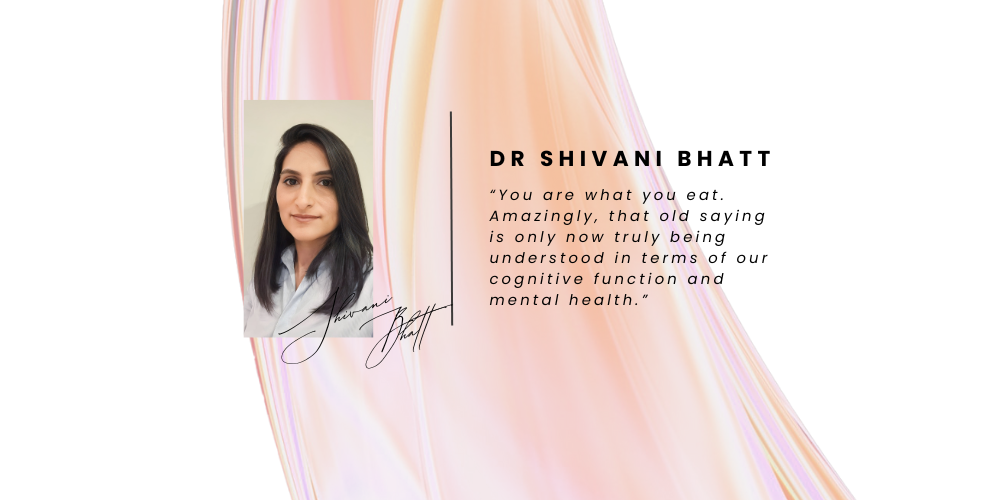
Nourishing the Mind: The Crucial Role of Nutrition for Neurodivergent Adults from a GP perspective
Share
You are what you eat. Amazingly, that old saying is only now truly being understood in terms of our cognitive function and mental health.
When it comes to managing neurodivergent conditions such as autism, ADHD, and other neurodivergent conditions emerging research suggests that the foods consumed can significantly impact their well-being. As a GP I am seeing a significant increase in referrals for diagnosis but how can I help in the interim? Lifestyle measures are the best way to empower anyone when advising them on taking control of their health whether neurodivergent or neurotypical.
In this article, we will explore the importance of nutrition for neurodivergent adults, highlighting foods and drinks to avoid, and providing evidence based best options.
The Link Between Nutrition and Neurodivergence
Scientific studies have increasingly shed light on the interplay between nutrition and neurodivergence. A balanced diet can potentially help alleviate symptoms and improve overall well-being. Here are some key nutrients:
- Omega-3 Fatty Acids: Omega-3 fatty acids, found in fatty fish (e.g., salmon), walnuts, and flaxseeds, have been linked to improved cognitive function and reduce symptoms in neurodivergent individuals, particularly those with ADHD.
- Micronutrients: Micronutrients such as zinc, magnesium, and vitamin B6 play essential roles in the functioning of the nervous system. These are best found in fish, whole grains, spinach, avocados and black beans. Deficiencies in these nutrients have been associated with increased behavioural challenges in neurodivergent individuals.
- Gut-Brain Connection: Emerging research suggests a strong connection between gut health (gut microbiome) and neurological conditions. A balanced diet with a focus on fibre-rich foods, like fruits and vegetables, can support a healthy gut microbiome, potentially benefiting neurodivergent adults.
- Lean Proteins: Lean protein sources like chicken, turkey, and legumes are rich in amino acids, which are crucial for neurotransmitter function and mood regulation.
- Essential Vitamins and antioxidants: Eat the rainbow of colourful fruit and vegetables to support gut health and brain function. They do this by fuelling the brain’s cells and protecting it from oxidative stress- “waste” products (free radicals) produced when the body uses oxygen.
Foods and Drinks to Avoid:
Avoiding certain foods and drinks is equally important in managing neurodivergent conditions. Research indicates that the following items may exacerbate symptoms:
- Sugar and Artificial Additives: Excessive sugar intake and artificial additives can lead to hyperactivity, mood swings, and poor concentration. Avoid sugary snacks, processed foods, and artificially coloured beverages.
- Gluten and Casein: Some neurodivergent individuals may benefit from eliminating gluten (found in wheat) and casein (found in dairy) from their diets, as they can be linked to gastrointestinal discomfort and behavioural challenges.
- Caffeine: Caffeine can increase anxiety and restlessness in neurodivergent adults. Reducing or eliminating caffeine from the diet can lead to a calmer state of mind.
The importance of nutrition in the lives of neurodivergent (and neurotypical) adults cannot be overstated and healthcare professionals should advocate it for all, as research continues to uncover the intricate relationship between what we eat and how our minds function. By avoiding foods and drinks that exacerbate symptoms and focusing on a diet rich in brain-boosting nutrients, individuals with neurodivergent conditions can lead healthier, more fulfilling lives.
Top 5 Takeaways:
- Incorporate fatty fish like salmon and nuts (e.g., walnuts) into your diet to benefit from omega-3 fatty acids.
- Prioritise leafy greens and colourful fruits and vegetables for their essential nutrients and antioxidants.
- Be mindful of sugar, artificial additives, gluten, and casein, as they can exacerbate symptoms.
- Limit or eliminate caffeine to reduce anxiety and restlessness.
- Consider the unique dietary needs of neurodivergent adults and consult with a healthcare professional or nutritionist to develop a personalised nutrition plan.
